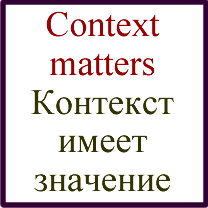
When learning new words in foreign tongues I find that I can remember some words more easily than others, especially if they are similar to words I already know in English or other languages. Other words don’t seem to stick in my memory so easily, even if I try to connect their unfamiliar sounds to familiar words.
In Russian and Czech, for example, there are quite a few words that I can understand when I see them in a sentence, but may not be so sure what they mean when I encounter them on their own – having some context makes all the difference.
Another challange with Russian, at least for me, is recognising words at a glance. Words written in the Cyrillic alphabet don’t seem to have such distinctive shapes as those written in the Latin alphabet, which makes them more difficult to distinguish. This is probably because I haven’t spent enough time reading Russian texts.
Words in Swedish, Danish and Spanish, the other languages I’m working on at the moment, tend to be much easier for me to remember. Many of them are simliar to English, or to other languages I know. The ones that aren’t similiar tend to be short, especially in Swedish and Danish, and I find them easier to remember than longer Russian or Czech words.
Learning lists of words without any context can work with a lot of repetition, and maybe some mnemonic techniques, but it seems to be better to learn words in context.
How do you learn vocabulary?
Hi Simon,
I am also learning Russian these days. And feels good to know that there is someone who really think like I do. I agree with you that the similar alphabetic look of Russian language with Latin creates confusion sometimes.
Thanks for sharing good ideas.
Freya, UK